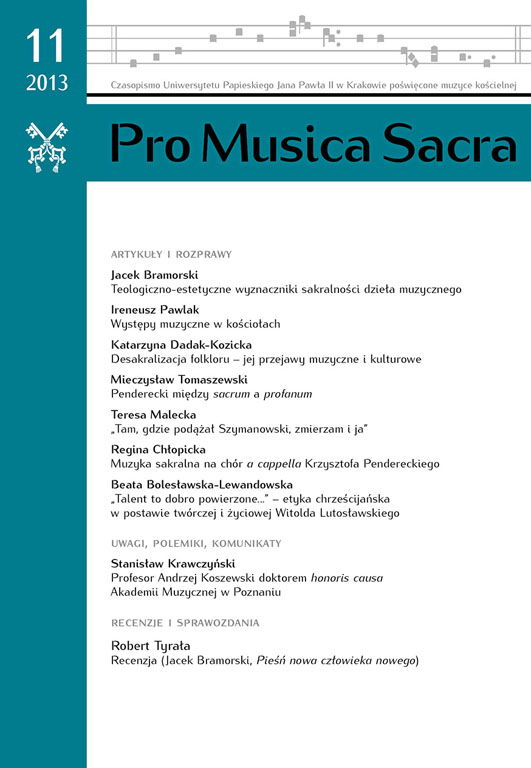„Talent to dobro powierzone...” – etyka chrześcijańska w postawie twórczej i życiowej Witolda Lutosławskiego
DOI:
https://doi.org/10.15633/pms.560Słowa kluczowe:
Witold Lutosławski, history of Polish music, WWII, Martial Law in Poland, folk songs, Christmas carolsAbstrakt
„Talent is a form of wealth entrusted to us” – these words may serve as Witold Lutosławski’s motto. He repeated them often and at many occasions, emphasising that each creative artist is obliged to treat his talent carefully and develop it to produce great results for public consumption. This corresponds well with Biblical parable on talents but does it mean that Lutosławski was a religious man? Was Christian ethic important to him? In his music there is no much connection with religion – only his youthful Lacrimosa for soprano, choir and orchestra, and the arrangements of traditional Polish Christmas carols, composed shortly after the Second World War, present his direct relations to religious inspirations. However, he did not like to talk about his beliefs and worldview, especially in the context of his own music, which for him always was abstract and free from any extra-musical features. But his attitude to composing, as well as to the public activity, reveals many connections with Christianity values. He was brought up in the family of strongly catholic and patriotic beliefs, connected with high moral principles. An atmosphere of Lutosławskis’ family, which belonged to the intellectual elites of pre-war Poland, made strong influence on young Witold. For the rest of his life he felt obliged to pay his duties both as a composer and as a man of a high moral standards. He not only concentrated on his creative work (though it was his main life obligation) but searched for public weal in his social activity, always aiming „to behave decently”. This corresponds perfectly with Christian ethic and indeed in one of his interviews Lutosławski openly admitted that not only his worldview was formed by Catholicism, towards which he remained faithful, but also that in his opinion Christian ethic remains pre-eminent among all ethic systems formed by the humanity.Pobrania
Opublikowane
2013-12-30
Numer
Dział
Artykuły i rozprawy
Licencja
Prawa autorskie (c) 2013 Beata Bolesławska-Lewandowska

Utwór dostępny jest na licencji Creative Commons Uznanie autorstwa 4.0 Międzynarodowe.
Autorzy publikujący w czasopiśmie udzielają jego wydawcy zgody o następującej treści:
- Autor zachowuje autorskie prawa majątkowe do utworu, a jednocześnie udziela wydawcy czasopisma zgody na jego pierwszą publikację w wersji drukowanej i wersji online na licencji Creative Commons Uznanie autorstwa 4.0 Międzynarodowe oraz zgody na wykonywanie opracowań, w tym przekładów.
- Autor ma możliwość udzielania zgody niewyłącznej na opublikowanie utworu w wersji, która ukazała się w czasopiśmie (np. zamieszczenia go w repozytorium instytucjonalnym lub opublikowania w książce), wraz z informacją o jego pierwszej publikacji w czasopiśmie.
- Autor może umieścić swój utwór online (np. w repozytorium instytucjonalnym lub na swojej stronie internetowej) jeszcze przed zgłoszeniem utworu do czasopisma.

